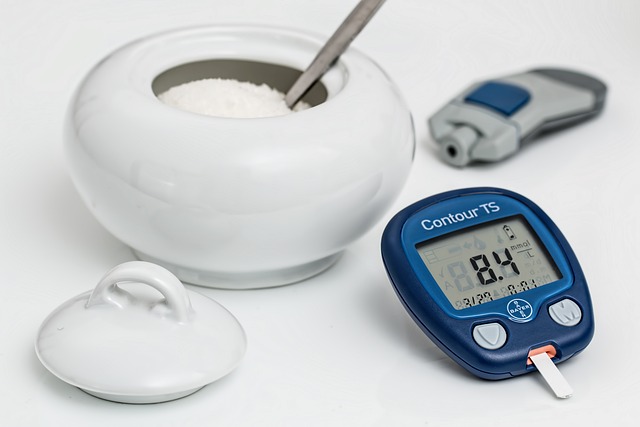No wonder you always hear the word diabetes in general and type 2 diabetes in particular.
In fact, diabetes is a very common diagnosis that in 2019, around 4 million people were diagnosed with diabetes in the UK alone.
And research shows that an additional 13.6 million people in the UK are at risk of developing type 2 diabetes. [1]
So, what is diabetes?
And what is type 2 diabetes?
Diabetes is a very serious chronic metabolic condition that affects how your body uses the food you eat.
It is associated with impaired ability to secrete or use the insulin that your body produces. [2]
While in type I diabetes the body does not produce sufficient insulin to bring glucose into the cells and use it for energy, in type 2 diabetes, your body has the insulin, but there is insulin resistance.
In other words, research shows that your body cannot use the insulin it produces because your cells are resistant. [2],[3]
So, what happens when you cannot use the insulin?
When glucose builds in your blood stream, your body is stimulated to secrete more insulin.
By the passage of time, your pancreas cells responsible for secreting insulin become exhausted and no longer able to secrete insulin.
At this stage, your doctor may recommend injecting insulin into your body to help metabolise the food you consume. [2]
If your blood glucose is constantly high, your cells cannot function properly and research shows that by the passage of time, damage occurs to the small vessels supplying blood to your nerves and organs. [2],[3]
For this reason, it is important to detect the early symptoms of type 2 diabetes and address the problem right away in its early stages.
Type 2 Diabetes Symptoms in Men and Women
A new 2021 analysis revealed that the number of people diagnosed with diabetes in London is 599,699. [4]
This number accounts for 6.7% of the overall population with the majority of diagnoses made for type 2 diabetes which is the most common. [4]
Did you know that type 2 diabetes may be asymptomatic for years before it is diagnosed, and it is often detected when it starts causing noticeable complications?
In the past, it was believed that type 2 diabetes affects older people.
However, research shows that due to today’s sedentary lifestyle and poor food choices, it can affect people in younger ages. [5]
For this reason, it is important to be familiar with the most common type 2 diabetes symptoms:
Typically, the classic type 2 diabetes symptoms in women and men occur when the blood glucose level is higher than normal.
These symptoms include three words all starting with “P”
- Polydipsia: which means increased thirst
- Polyuria: which means increased and frequent urination
- Polyphagia: which means increased hunger and appetite for food [5]
In addition to these symptoms, diabetes type 2 causes other less frequent symptoms including:
- weight loss
- Restlessness
- Unexplained body pain. [5]
- Tingling sensation in your hands and feet [6]
On top of that, research shows that there are some unusual symptoms of type 2 diabetes in men and women that you might miss, including:
- Fatigue
- Depression [7]
- Irritability
- Itching
- Poor immunity and recurrent infections
- Delayed wound healing
- Skin tags
- Acanthosis nigricans which is dark discoloration of the skin usually appears in the back of the neck and body folds such as the armpits and the groin. [8]
Type 2 diabetes symptoms in men are similar to Type 2 diabetes symptoms in women.
However, research shows that due to the differences in male and female bodies, erectile dysfunction can be one of the characteristic type 2 diabetes symptoms in men while in women, type 2 diabetes causes vaginal and urinary tract infections more frequently [9],[10].
Why diabetes type 2 causes weight loss?

Many people think that diabetes is connected with diabetes weight gain around the belly.
Which is true when your insulin levels are high.
Because insulin is a fat-storing hormone, high level of insulin is associated with increased fat, especially around the waist.
However, this weight gain only occurs when you have too much insulin in your body. [11]
This is why you might notice it when your doctor prescribes insulin to regulate your blood glucose level.
But, what about the causes of diabetes weight loss?
You must be wondering how type 2 diabetes causes weight loss and whether or not it is a healthy weight loss.
Here is what you need to know…
When you do not have enough insulin, glucose from the food you eat builds up in your blood and –– as you know –– type 2 diabetes causes insulin resistance.
Which means your cells are unable to utilise the glucose you eat.
In this case, your body does not get enough energy from the food you take and thus, it tends to break down muscles and fats to produce energy. [11]
This is one of the causes of diabetes weight loss you might notice instead of the typical diabetes weight gain you have in mind.
- Would you like to safely and effectively shed the extra pounds?
You can successfully enjoy beating your diabetes type 2 using this expertly medically supervised.
- This is a comprehensive type 2 diabetes plan containing a laser sharp customised nutrition programme, 1-2-1 exercise programme and the correct supplementation you need working directly with Jazz Alessi and a medical doctor.
Why Does Type 2 Diabetes Make You Feel So Tired?
 Diabetes type 2 causes a variety of symptoms because it is associated with a complex cascade of metabolic changes.
Diabetes type 2 causes a variety of symptoms because it is associated with a complex cascade of metabolic changes.
So, if you feel out of energy, always tired and unable to carry out some of the activities you are used to, diabetes can be the one to blame.
There are many reasons why diabetes is associated with lethargy and fatigue, for instance:
- Poor Glucose Uptake
Did you know that most of the energy from foods you consume go to your muscles.
In fact,
Research shows that your skeletal muscle uses about 80% of the glucose from the food you eat. [12]
This glucose uptake is stimulated by insulin and thus, if you have insufficient insulin, your muscles will not get enough glucose to produce energy. [12]
This is why you might feel out of energy and tired most of the time even when trying to carry out the simple tasks you are used to.
- Muscle Mass Loss
Because insulin resistance impairs glucose uptake, your body becomes unable to use the glucose for energy and thus, looks for other sources.
In fact, your body starts using muscles and fat to produce energy in a process called gluconeogenesis.
At this point, you lose muscles [12] and start feeling less energetic and tired with minimal effort that used to be easier for you in the past.
- Dehydration and Electrolyte Imbalance
When you have a high glucose level in your blood, your kidney tries to get rid of extra glucose by increasing the frequency of urination; this frequent urination is a famous symptom called polyuria.
Although it is an innocent attempt from the body to correct your blood glucose level, it leads to losing too much water along with electrolytes such as potassium and sodium. [13]
In addition, high glucose does not allow your cells to function normally and it leads to electrolyte imbalance between the inside and the outside of your cells. [13]
This dehydration and imbalance in electrolytes can make you feel lethargic and out of energy most of the time.
Connection Between Obesity and Type 2 Diabetes
 The lingering question about obesity and diabetes is:
The lingering question about obesity and diabetes is:
which one comes first?
Well, there is no doubt that obesity and type 2 diabetes are so closely related that they even came up with a term connecting both type 2 diabetes and obesity together called “diabesity”.
And although this is not a diagnosis, it means that you have both at a time.
But,
Is it that diabetes type 2 causes weight gain or the other way round?
In fact, research shows that you can never tell which happens first because the mechanisms by which they occur are closely interrelated.[14]
Here is how:
How Insulin Resistance Leads to Obesity
Although obesity and diabetes are a two-way street, insulin resistance can cause weight gain due to:
Excessive Fat Storage
As I mentioned before, insulin stores excess glucose in your fat cells leading to weight gain.
For this reason, if you have insulin resistance, your pancreas will be signaled to secrete more insulin.
If you are injecting insulin as a part of your diabetes control plan, you might be more at risk for gaining weight if you do not follow the right customised type 2 diabetes diet plan. [14]
Excessive Increased Appetite
High levels of insulin in your body triggers hunger centers in your brain and makes you crave sweets even more.
This is why it can make you eat uncontrollably and can lead to weight gain and further emphasise the correlation between type 2 diabetes and obesity. [15]
How Obesity Leads to Insulin Resistance
 The mechanism behind adult obesity and type 2 diabetes is not yet fully understood.
The mechanism behind adult obesity and type 2 diabetes is not yet fully understood.
However, research shows that it is thought to be due to change in cell functions caused by obesity and poor food choices.
These changes include:
- Increased Cell Inflammation:
Which impairs cell function and can lead to your cells being more resistant to insulin.[16]
- Increased Oxidative Stress:
Similar to the pro-inflammatory mechanism, high oxidative stress can affect how smoothly your cells respond to insulin and can make them insulin-resistant.
In addition, it affects Beta cells of your pancreas and makes them unable to effectively secrete insulin [16],[17] this is the common mechanism relating PCOS weight gain Diabetes and Insulin resistance together.
- Impaired Leptin Function:
Leptin is a hormone secreted by fat cells; it is mainly responsible for making you feel full and it plays a major role in regulating insulin secretion and blood glucose levels.
Adult obesity and type 2 diabetes can be caused by impaired leptin function associated with weight gain. [18]
Don’t let PCOS weight gain Diabetes and Insulin resistance control your life.
If you suffer from a hormonal disturbance and you are looking for the correct PCOS rehab programme to increase your chances of getting pregnant, all you need is a laser-sharp evidence based customised rehabilitation programme to meet your own goals.
Contact Jazz Alessi for a FREE CONSULTATION.
Type 2 Diabetes and Steps for Weight Loss
The dream of having a perfect, summer-ready body has evolved throughout the years.
People in the past just cared about how their bodies look like and wanted to have a narrow waist line and a flat stomach at all costs.
But now, with the raised awareness, people are more concerned about having slim –– but healthy–– bodies.
If you read this article this far, you could be one of those who believe that a slim body starts from the inside –– literally!
And by saying the inside, I mean visceral fats.
Visceral fat is your worst enemy because it:
- Surrounds and impair your organs
- Increases triglycerides and bad cholesterol in your blood due to the close Diabetes / Cholesterol and Saturated Fat correlation
- Increases your risk of cardiovascular disease (e.g., heart attack, stroke and high blood pressure)
- Increase your risk of insulin resistance
For this reason, it is wise to stop listening to the scale and start listening to your body and how it responds to a healthy, balanced and laser sharp customised type 2 diabetes diet programme that helps you successfully lose both visceral and subcutaneous fat.
Here is how to start:
- Set Small And Realistic Goals
It is always good to dream big.
However, when it comes to your fitness goals, make sure you set smaller, realistic, and achievable goals. [19]
Even if you are dreaming to go from zero to hero, break it into steps that you can achieve in no time.
Having smaller, easier-to-achieve goals helps you:
- See the result of your effort
- Stay motivated
- Achieve more
- Keeps you inspired
- Avoid the disappointment of not reaching your bigger goals right away because big achievements do not occur overnight.
- Reach your goals safely without any complications
- Introduce the healthy habits into your lifestyle [19]
If you are not sure what a safe, realistic, achievable goal is for your diabetic condition, current level and health circumstances, talk to Jazz Alessi, number one elite personal trainer in London.
Request a FREE CONSULTATION NOW!
- Focus On The Quality Not The Quantity
 That is right!
That is right!
You can eat more and still weigh less.
Because food is not about how much you eat, it is about what you eat and how you mind portion size.
Basically, every type of food provides you with a specific number of calories per gram consumed.
Research shows that each gram of fats for example provides 9 calories, while carbohydrates and proteins each provide 4 calories per gram. [20]
Since diabetes type 2 makes it harder for you to convert glucose into energy, it is smarter to change your food choices to things that are tasty, make you feel full and also account for less when it comes to calories.
So, if you are used to having a cheesy burger with fries and a soft drink, this might make you feel full.
But it also destroys your good gut bacteria, increases cravings, anxiety, and depression whilst it provides a huge number of calories that may exceed your needs and then get stored in your body in form of fat.
Try replacing it with a big healthy bowl of salad with your favourite home dressing, a big bowl of vegetable-based broth and a fresh green smoothie of your favourite low GL fruits followed by a yummy snack of nuts.
Believe it or not…
Research shows that all these healthier options will make you full and will provide less calories than fried, processed foods. [21]
- Learn About Glycemic Index
Glycemic index is a very smart ranking system that categorises carbohydrates depending on how much they increase your blood sugars.
According to GI, foods might have a: high, medium and low glycemic index.
It is always smarter to include low glycemic index foods in your type 2 diabetes diet because these foods will help you:
- Lose weight
- Improve your insulin resistance
- Control your blood glucose level
- Reduce your risk of heart diseases
- Reduce blood cholesterol and reverse the Diabetes / Cholesterol and Saturated Fat vicious circle by normalising your lipid profile
- Control your appetite and prevent craving
- Improve your exercise performance [22]
Also, make sure that you take into account the glycemic load of foods (GL).
- Use a Glucometer
According to an Insulin resistance – saturated fat research that targeted 2200 diabetic and high-risk participants, 97.3% of males and 93.1% of females were unaware about the importance of monitoring their blood glucose levels! [23]
Getting feedback on how you are doing is a great way to keep your blood sugar in control.
Doctors often advice all diabetics and pre-diabetics to have a glucometer at home in order to continuously monitor their blood sugar.
You can also consult your doctor on the best type of NHS approved glucometers that you can:
- See how the food you eat affects your blood sugar,
- Follow up how your exercise plan reduces your blood glucose so that you can remain motivated to workout on regular basis.
- Adjust your diabetes medication doses and
- Detect and report changes to your doctor. [24]
- Get Active – And Why Exercise Safety Is Crucial
 Local statistics and Insulin resistance – saturated fat research show that in 2021, 61.4% of London and UK were physically active. [25]
Local statistics and Insulin resistance – saturated fat research show that in 2021, 61.4% of London and UK were physically active. [25]
If you are not among those people, time to catch up with the rest of Londoners!
Exercising for a minimum of 150 minutes per week (I personally recommend you to aim for 300 minutes / week) can help you:
- Regulate your blood glucose
- Improve your cells’ sensitivity to insulin
- Enhance glucose uptake within your muscles
- Reduce high blood cholesterol levels
- Improve your heart health
If you are pre-diabetic, a customised exercise programme can reduce your risk of diabetes by 58% if you keep it on regular basis. [26]
- Time to start and keep it up with London’s best personal trainer who will create the best exercise and nutrition plan for your metabolic conditions?
Request a FREE CONSULTATION NOW!
- Poor Habits Effects
Poor habits are things you do every day that are now engrained in your brain and you subconsciously do them without considering the consequences.
These bad habits can be as simple as eating while watching TV, snacking on chocolate, or grabbing an energy drink on your break. [27]
- But, did you know that these bad habits might be sabotaging all the effort you exert to control your blood sugar and lose weight?
That is right, these snacks you think of as small might add up to your calories, and those energy drinks will make you hungry and eating in front of your favourite movie will make you eat more than you should.
So, to make your programme even more successful, make sure you get rid of these habits before they push you away from your health goals. [27]
- Support Your Mental Health
 Did you know that in 2021, around 17% of adults in London and the UK experienced some form of depression compared to just 10% before 2019? [28]
Did you know that in 2021, around 17% of adults in London and the UK experienced some form of depression compared to just 10% before 2019? [28]
This must be taken seriously because depression and other mental health problems not only do affect your mood and mindset, but also your physical health.
According to the American Association of Diabetes, one in every three type-2 diabetes patients suffers from moderate to severe depression. [29]
This depression, other mental health problems and stress must be tackled because they interfere with:
- Your ability to control your medications
- Your commitment to the exercise plan
- Your commitment to the nutrition plan [29]
These negative impacts will eventually affect diabetes control and might hold you back from achieving your rehabilitation goals.
Are you looking for a successful diabetes type 2 rehab programme that will take into consideration both your physical and mental condition?
Keen to get started?
Jazz Alessi, number one elite personal trainer in London has got the answers to your questions.
REQUEST A FREE CONSULTATION NOW!
Diabetes Rehabilitation: There is no one-plan-fits-all
There is a countless number of exercises out there for diabetic patients.
But, do you think they are all suitable for you?
Although exercise can be your best friend as it helps you regulate your blood sugar, maintain its normal levels, lose weight and improve your insulin sensitivity, the wrong type of exercise, performed at the wrong time of the day can put you at risk of hypoglycemia (episodes of low blood sugar).
Imagine you are following an imbalanced nutrition pattern or a restricted diet and you are injecting insulin and at the same time exercising hard to normalise your blood sugar.
This seems like the perfect rehabilitation plan, right?
Unfortunately, research shows that by not providing your body with the right foods to fuel your exercise and exercising at your medication’s peak of action can both lead to sudden reduction in your blood glucose level that can put you in danger. [30]
This is why it is important to have:
- An expert personal trainer who would provide a laser-sharp customised exercise plan performed at the right intensity and at the right time of the day compared to the time you have your insulin shot to avoid sudden hypoglycemia during exercise
- A knowledgeable nutrition expert to provide the right type 2 diabetes diet plan and very effective natural supplementation that will help you feel energetic, burn calories, lose weight and at the same time fuel your muscles during exercise to avoid muscle breakdown and fatigue.
- A medical professional who would closely monitor your medications and health condition along with the nutrition and exercise plans to provide necessary dose adjustments as you improve.
WHO IS JAZZ ALESSI?
Being diagnosed with type 2 diabetes is not the end of the world.
Jazz Alessi uses his extensive knowledge and long-term expertise in diet and exercise planning to set personalised plans based on your very own case.
He takes into consideration your medical history, how long you have had Diabetes type 2 for, body tensions, injuries and other medical conditions you may have.
Jazz will create a very effective laser sharp customised comprehensive diabetes type 2 plan to improve your condition and help you go back to normal life under supervision and follow-up of experienced medical professionals.
Questions AND Answers
1. Can diabetes type 2 be reversed?
Unlike Type 1 Diabetes, type 2 diabetes can be controlled –– and even reversed in early stages –– without medications. This requires a dedicated change in your lifestyle including diet control, behavioral modification and regular exercises.
2. Can diabetics drink alcohol type 2?
There is no evidence that diabetics must totally avoid alcohol. However, just like non-diabetics, it is always better to watch your alcohol consumption and keep it to minimum (ideally to eliminate it). Too much alcohol will create insulin resistance whilst it can impair your judgement and hold you back from committing to your body transformation rehabilitation plan.
3. Is type 2 diabetes curable?
There is currently no cure for type 2 diabetes. However, lifestyle modification in form of diet, exercise and very effective natural supplementation can help you normalise your blood sugar and prevent complications. Your doctor can also recommend tablets or insulin injections.
4. Is type 2 diabetes very serious?
If uncontrolled, type 2 diabetes can lead to serious complications by affecting your vessels and compromise blood supply to important organs such as the eyes, kidneys and the heart. It can also affect your nerves leading to impaired sensation and there are diabetes related amputations.
References
1- Diabetes UK: preventing type 2 diabetes
https://www.diabetes.org.uk/preventing-type-2-diabetes
2- Goyal R, Jialal I. Diabetes Mellitus Type 2. [Updated 2022 Jun 19]. In: StatPearls [Internet]. Treasure Island (FL): StatPearls Publishing; 2022 Jan-. Available from: https://www.ncbi.nlm.nih.gov/books/NBK513253/
3- centers for disease control and prevention: Fact sheets about Diabetes https://www.cdc.gov/diabetes/library/factsheets.html
4- Diabetes UK: diabetes hits almost 600,000 in London https://www.diabetes.org.uk/in_your_area/london/london-region-news-/prevalance
5- Ramachandran, Ambady. (2014). Know the signs and symptoms of diabetes. The Indian journal of medical research. 140. 579-81. https://www.researchgate.net/publication/270825871_Know_the_signs_and_symptoms_of_diabetes
6- American Diabetes Association. (No date.) “Peripheral Neuropathy.” https://www.diabetes.org/diabetes/neuropathy/peripheral-neuropathy
7- Jain A, Sharma R, Choudhary PK, Yadav N, Jain G, Maanju M. Study of fatigue, depression, and associated factors in type 2 diabetes mellitus in industrial workers. Ind Psychiatry J. 2015 Jul-Dec;24(2):179-84. doi: 10.4103/0972-6748.181731. PMID: 27212824; PMCID: PMC4866347
https://www.ncbi.nlm.nih.gov/pmc/articles/PMC4866347/
8- Skin issues and diabetes: American Academy of Dermatology. (No date.) “Diabetes: 12 Warning Signs That Appear on Your Skin.”
https://www.aad.org/public/diseases/a-z/diabetes-warning-signs
9- Erectile dysfunction: Indian Journal of Psychological Medicine. (2017.) “Erectile Dysfunction: An Underestimated Presentation in Patients with Diabetes Mellitus.” https://www.ncbi.nlm.nih.gov/pmc/articles/PMC5688886/
10- Nitzan O, Elias M, Chazan B, Saliba W. Urinary tract infections in patients with type 2 diabetes mellitus: review of prevalence, diagnosis, and management. Diabetes Metab Syndr Obes. 2015 Feb 26;8:129-36. doi: 10.2147/DMSO.S51792. PMID: 25759592; PMCID: PMC4346284.
https://www.ncbi.nlm.nih.gov/pmc/articles/PMC4346284/
11- Diabetes symptoms: When diabetes symptoms are a concern. Mayo Clinic. https://www.mayoclinic.org/diseases-conditions/diabetes/in-depth/diabetes-symptoms/art-20044248. Accessed 9/10/2020
12- Merz KE, Thurmond DC. Role of Skeletal Muscle in Insulin Resistance and Glucose Uptake. Compr Physiol. 2020 Jul 8;10(3):785-809. doi: 10.1002/cphy.c190029. PMID: 32940941; PMCID: PMC8074531.
https://www.ncbi.nlm.nih.gov/pmc/articles/PMC8074531/
13- Liamis G, Liberopoulos E, Barkas F, Elisaf M. Diabetes mellitus and electrolyte disorders. World J Clin Cases. 2014 Oct 16;2(10):488-96. doi: 10.12998/wjcc.v2.i10.488. PMID: 25325058; PMCID: PMC4198400.
https://www.ncbi.nlm.nih.gov/pmc/articles/PMC4198400/
14- Tsegyie, Yohannes. (2020). Obesity, Insulin Resistance, and Type 2 Diabetes: Associations and Therapeutic Implications. Diabetes, Metabolic Syndrome and Obesity: Targets and Therapy. 13. 3611-3616. 10.2147/DMSO.S275898.
https://www.researchgate.net/publication/344550145_Obesity_Insulin_Resistance_and_Type_2_Diabetes_Associations_and_Therapeutic_Implications
15- Rodin J. Insulin levels, hunger, and food intake: an example of feedback loops in body weight regulation. Health Psychol. 1985;4(1):1-24. doi: 10.1037//0278-6133.4.1.1. PMID: 3894001.
https://pubmed.ncbi.nlm.nih.gov/3894001/#:~:text=These%20experiments%20show%20that%20elevations,may%20affect%20subsequent%20food%20intake.
16- Ormazabal, V., Nair, S., Elfeky, O. et al. Association between insulin resistance and the development of cardiovascular disease. Cardiovasc Diabetol 17, 122 (2018). https://doi.org/10.1186/s12933-018-0762-4
https://cardiab.biomedcentral.com/articles/10.1186/s12933-018-0762-4#citeas
17- Asmat U, Abad K, Ismail K. Diabetes mellitus and oxidative stress-A concise review. Saudi Pharm J. 2016 Sep;24(5):547-553. doi: 10.1016/j.jsps.2015.03.013. Epub 2015 Mar 21. PMID: 27752226; PMCID: PMC5059829.
https://www.ncbi.nlm.nih.gov/pmc/articles/PMC5059829/
18- Amitani M, Asakawa A, Amitani H, Inui A. The role of leptin in the control of insulin-glucose axis. Front Neurosci. 2013 Apr 8;7:51. doi: 10.3389/fnins.2013.00051. PMID: 23579596; PMCID: PMC3619125.
https://www.ncbi.nlm.nih.gov/pmc/articles/PMC3619125/
19- Alberta health services: Setting goals for lifestyle change
https://www.albertahealthservices.ca/assets/info/nutrition/if-nfs-setting-goals-lifestyle-change.pdf
20- Food and Nutrition Information Center (FNIC): National Agricultural Library U.S. Department of Agriculture
https://www.nal.usda.gov/programs/fnic#:~:text=How%20many%20calories%20are%20in,provides%209%20calories%20per%20gram.
21- Centers for Disease Control and Prevention: eat more, weigh less
https://www.cdc.gov/nccdphp/dnpa/nutrition/pdf/energy_density.pdf
22- Native Woman’s Association of Canada: Fact sheet: Glycemic Index https://www.nwac.ca/assets-knowledge-centre/2012-Diabetes-Glycemic-Index-Fact-Sheet.pdf
23- Bani, I. (2015) Prevalence, Knowledge, Attitude and Practices of Diabetes Mellitus among Jazan Population, Kingdom of Saudi Arabia (KSA). Journal of Diabetes Mellitus, 5, 115-122. doi: 10.4236/jdm.2015.52014.
https://www.scirp.org/journal/CTA.aspx?paperID=56406
24- Mathew TK, Tadi P. Blood Glucose Monitoring. [Updated 2022 Aug 8]. In: StatPearls [Internet]. Treasure Island (FL): StatPearls Publishing; 2022 Jan-. Available from: https://www.ncbi.nlm.nih.gov/books/NBK555976/
25- Gov.UK: Physical Activity (2022)
https://www.ethnicity-facts-figures.service.gov.uk/health/diet-and-exercise/physical-activity/latest
26- Colberg SR, Sigal RJ, Fernhall B, Regensteiner JG, Blissmer BJ, Rubin RR, Chasan-Taber L, Albright AL, Braun B; American College of Sports Medicine; American Diabetes Association. Exercise and type 2 diabetes: the American College of Sports Medicine and the American Diabetes Association: joint position statement. Diabetes Care. 2010 Dec;33(12):e147-67. doi: 10.2337/dc10-9990. PMID: 21115758; PMCID: PMC2992225.
https://www.ncbi.nlm.nih.gov/pmc/articles/PMC2992225/
27- Sami W, Ansari T, Butt NS, Hamid MRA. Effect of diet on type 2 diabetes mellitus: A review. Int J Health Sci (Qassim). 2017 Apr-Jun;11(2):65-71. PMID: 28539866; PMCID: PMC5426415.
https://www.ncbi.nlm.nih.gov/pmc/articles/PMC5426415/
28- Depression in the UK 2022: Champion health
– https://championhealth.co.uk/insights/depression-statistics/#:~:text=Around%2017%25%20of%20adults%20in,just%20a%20public%20health%20issue.
29- American association of Diabetes: Chapter 6 –– Depression
https://professional.diabetes.org/sites/professional.diabetes.org/files/media/ada_mental_health_workbook_chapter_6.pdf
30- Younk LM, Mikeladze M, Tate D, Davis SN. Exercise-related hypoglycemia in diabetes mellitus. Expert Rev Endocrinol Metab. 2011 Jan 1;6(1):93-108. doi: 10.1586/eem.10.78. PMID: 21339838; PMCID: PMC3039442.
https://www.ncbi.nlm.nih.gov/pmc/articles/PMC3039442/



